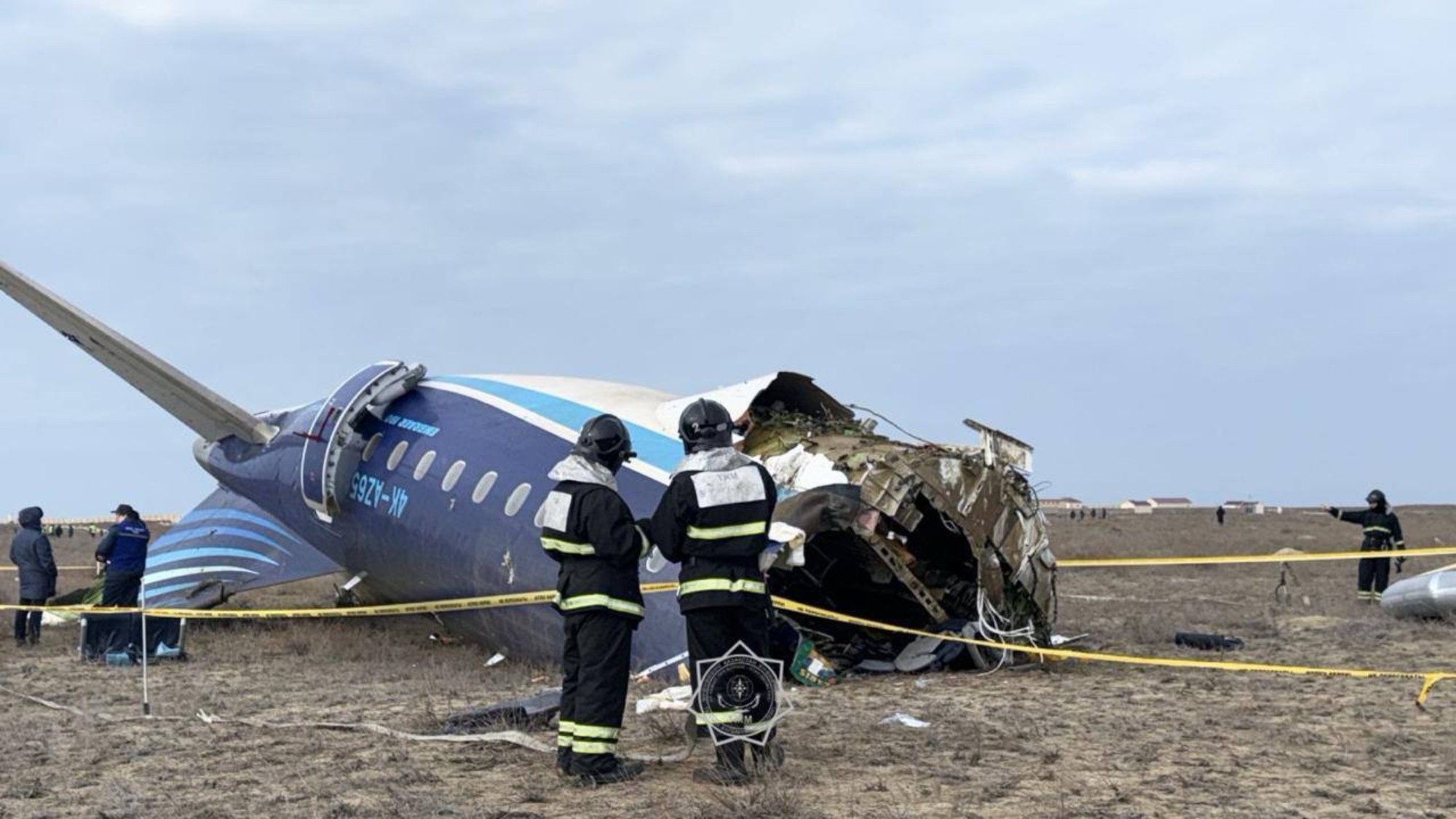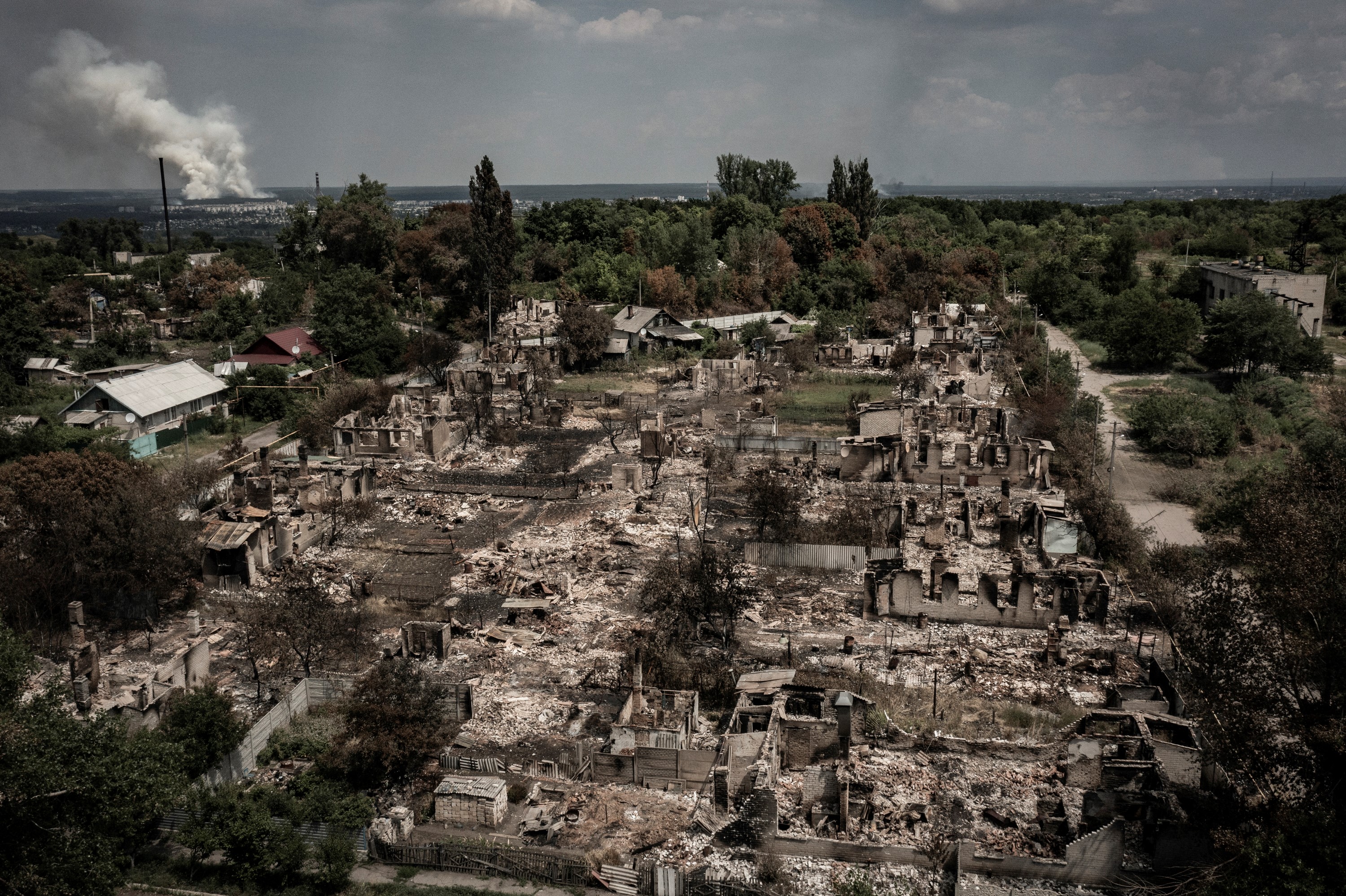Was the Azerbaijan Airlines plane shot down?
Multiple sources claim Russian anti-aircraft missile damaged passenger jet, leading to Christmas Day crash that killed at least 38

A free daily email with the biggest news stories of the day – and the best features from TheWeek.com
You are now subscribed
Your newsletter sign-up was successful
Claims are mounting that the Azerbaijan Airlines plane that crashed over Kazakhstan on Christmas Day was hit by a Russian air defence weapon.
Flight J2-8432 was scheduled to fly from the Azerbaijani capital of Baku to Grozny, capital of the Russian republic of Chechnya. But the plane veered hundreds of miles off course after being diverted over the Caspian Sea towards Kazakhstan, and crash-landed near the city of Aktau, killing at least 38 of the 67 people on board.
Azerbaijani government sources "exclusively confirmed" that a Russian surface-to-air missile caused the plane crash, according to Euronews. But Russia's aviation watchdog said the emergency might have been caused by a "collision with birds". The Kremlin warned against promoting "hypotheses" about the disaster before investigations conclude.
The Week
Escape your echo chamber. Get the facts behind the news, plus analysis from multiple perspectives.

Sign up for The Week's Free Newsletters
From our morning news briefing to a weekly Good News Newsletter, get the best of The Week delivered directly to your inbox.
From our morning news briefing to a weekly Good News Newsletter, get the best of The Week delivered directly to your inbox.
What did the commentators say?
There's "almost no question or doubt" that the plane was hit by shrapnel, said Bulgarian investigative journalist and author Christo Grozev. A "logical hypothesis" is that an anti-aircraft missile exploded near the airplane, he told BBC Radio 4.
Video footage of parts of the downed fuselage "showed puncture holes consistent with the shower of shrapnel produced by a missile strike", said The Times. The damage was "similar" to that inflicted when a Russian anti-aircraft system shot down Malaysia Airlines Flight MH17 over Ukraine in 2014, killing all 298 passengers.
Sources told Euronews that a missile was fired at the Azerbaijan Airlines jet during "drone air activity above Grozny", as Russian forces attempted to shoot down Ukrainian aircrafts, and "exploded next to the aircraft mid-flight".
The plane's pilots allegedly requested to make an emergency landing in Russia but were "ordered" to fly hundreds of miles across the Caspian Sea – and according to flight tracking data, their craft's GPS navigation systems were "jammed" throughout the flight over southwest Russia, said Euronews.
A free daily email with the biggest news stories of the day – and the best features from TheWeek.com
Azerbaijani news station AnewZ said that "presumably", the "recommendation" to fly on "was given for one purpose: for the plane to fall into the Caspian Sea, all witnesses would be killed and the plane would sink".
Aviation officials in Grozny, and Azerbaijan's President Ilham Aliyev, claimed the jet had been redirected because of fog. Russia and Kazakhstan also "attempted to shrug off the allegations" of missile damage, said The Times, although officials did not explain why the plane didn't make an emergency landing in Russia.
The plane "was shot down by a Russian air defense system" said Andriy Kovalenko, head of Ukraine's Centre for Countering Disinformation, on X, but "efforts will be made" to "cover it up".
US sources have also claimed that a Russian anti-aircraft system struck the jet, in what may have been "a case of mistaken identity", said CNN. An official reportedly claimed that "poorly trained Russian units" may have "fired negligently" against Ukrainian drones. Earlier on Wednesday, Russia's Defence Ministry had reported downing 59 Ukrainian drones over several regions.
Four sources with "knowledge of the preliminary findings" of Azerbaijan's investigation told Reuters that Russia was clearly to blame. "No one claims that it was done on purpose," said one source. "However, taking into account the established facts, Baku expects the Russian side to confess to the shooting down of the Azerbaijani aircraft."
Despite such accusations, said The Independent's travel correspondent Simon Calder, there is still a "wide spectrum of possibilities" for the cause of the crash, from a "catastrophic failure of an aircraft system" to a hijacking. Chechen separatists have also attacked Russian planes in the past. But accidental shoot-downs are increasingly common, "often involving Russia and Ukraine". And if Russian air defences are found to have caused this crash, "shoot-downs will be an ever-more common cause of fatalities in aviation accidents".
"At a time when air safety is improving globally, military action against civil aircraft is an increasing concern."
What next?
Officials from Azerbaijan and Kazakhstan have joined Russia in warning against speculation before investigations have concluded. A commission with representatives from all three nations has been set up to investigate the crash – although Russian and Azerbaijani law enforcement agencies "will not be allowed to conduct a forensic investigation", said CNN. Authorities have recovered a second black box that they hope "will shed light on the cause" of the disaster.
Six survivors from the crash were being treated in Aktau, with four in intensive care.
Harriet Marsden is a senior staff writer and podcast panellist for The Week, covering world news and writing the weekly Global Digest newsletter. Before joining the site in 2023, she was a freelance journalist for seven years, working for The Guardian, The Times and The Independent among others, and regularly appearing on radio shows. In 2021, she was awarded the “journalist-at-large” fellowship by the Local Trust charity, and spent a year travelling independently to some of England’s most deprived areas to write about community activism. She has a master’s in international journalism from City University, and has also worked in Bolivia, Colombia and Spain.
-
 Political cartoons for February 15
Political cartoons for February 15Cartoons Sunday's political cartoons include political ventriloquism, Europe in the middle, and more
-
 The broken water companies failing England and Wales
The broken water companies failing England and WalesExplainer With rising bills, deteriorating river health and a lack of investment, regulators face an uphill battle to stabilise the industry
-
 A thrilling foodie city in northern Japan
A thrilling foodie city in northern JapanThe Week Recommends The food scene here is ‘unspoilt’ and ‘fun’
-
 US, Russia restart military dialogue as treaty ends
US, Russia restart military dialogue as treaty endsSpeed Read New START was the last remaining nuclear arms treaty between the countries
-
 What happens now that the US-Russia nuclear treaty is expiring?
What happens now that the US-Russia nuclear treaty is expiring?TODAY’S BIG QUESTION Weapons experts worry that the end of the New START treaty marks the beginning of a 21st-century atomic arms race
-
 Ukraine, US and Russia: do rare trilateral talks mean peace is possible?
Ukraine, US and Russia: do rare trilateral talks mean peace is possible?Rush to meet signals potential agreement but scepticism of Russian motives remain
-
 How oil tankers have been weaponised
How oil tankers have been weaponisedThe Explainer The seizure of a Russian tanker in the Atlantic last week has drawn attention to the country’s clandestine shipping network
-
 US nabs ‘shadow’ tanker claimed by Russia
US nabs ‘shadow’ tanker claimed by RussiaSpeed Read The ship was one of two vessels seized by the US military
-
 What will happen in 2026? Predictions and events
What will happen in 2026? Predictions and eventsIn Depth The new year could bring peace in Ukraine or war in Venezuela, as Donald Trump prepares to host a highly politicised World Cup and Nasa returns to the Moon
-
 All roads to Ukraine-Russia peace run through the Donbas
All roads to Ukraine-Russia peace run through the DonbasIN THE SPOTLIGHT Volodymyr Zelenskyy is floating a major concession on one of the thorniest issues in the complex negotiations between Ukraine and Russia
-
 Russia’s ‘weird’ campaign to boost its birth rate
Russia’s ‘weird’ campaign to boost its birth rateUnder the Radar Demographic crisis spurs lawmakers to take increasingly desperate measures